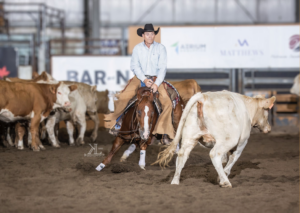
Madera, California trainer, Lyn Anderson, was hooked from that first moment she saw a cow horse at the Snaffle Bit Futurity in Reno, NV. At the time, Lyn was attending Cal Poly University where they had a sale program for their two-year-olds in training.
“From that moment on, I knew that is what I was going to do and became a cow horse trainer!”
Learning by watching everyone she could, Anderson started by working for some quarter horse people who did a bit of everything. It was there, Anderson knew “halter was something I would never be interested in.”
She then worked for a retired gentleman who had a herd of 47 head. When he passed away a year later, Anderson was left to help his widow sell off the remaining horses. “I began to work half time there and half time at home as I started to built up my own business.” This was an ideal situation for Anderson who said, “I got to get in front of people and the sale helped me to learn the showmanship.”
With help over the years from friends and mentors such as Sandy Collier, Greg Ward and Johnny Brazil and “everyone” in the cow horse world, Anderson has
become a world champion, accumulating almost 1 million in NRCHA earnings.
You can feel the love she has for her all-time favorite horse, Smart Time Tuck (Zip), now owned by Murray Thompson. Not only did Anderson win her first World Championship on him but Thompson went on to win a Non Pro world title on him as well. Smart Time Tuck was the first horse ever to win an NRCHA Regional Championship, National Championship and World Championship, in one year.
“He was such a joy to train and show and he stayed so good for so long. I just had him here on my place. He is 26 years old and still a character, pulling hoses out of water troughs and his personality is still the same, he is just a bit slower now,” Anderson said.
Over the years, some aspects of her training business have become easier. Anderson looks for “Horses that are athletes, that want to do their job and have lots of try. I enjoy a horse that wants to dominate a cow down the fence. If I have one that doesn’t want to do the cow horse, I try to get the people to take them home. I don’t want to work with something that doesn’t want to do its job,” she said.
“So many of today’s horses are bred to do it. It is just amazing to me how well they are breeding horses to do these specialized jobs. It is the ones who enjoy
it who tend to develop themselves. Yes, I am helping them but they are learning a lot on their own, every time you go to a show it is hopefully a good learning experience for them.”
As Anderson reflected on the difference between the horses early on in her career to today she said in the past she had to “train a horse that may have had limited capabilities where now the horses are helping you as much as you are helping them! I am not working near as hard as I use to, which is a good thing because I physically can’t work as hard as I use to,” said Anderson.
The best advice Anderson can share with up-and-coming trainers is “to work towards buying the fancy trailers and a place, go make the money then go buy to the stuff and that will keep you out of a lot of trouble. And work with the horse you have, not the horse your neighbor is riding. Every horse has its niche, just try to figure out that horse’s ability and train it to the best it can be, without over-working the horse.”
One thing that helped Anderson become a world renowned horsewoman, trainer and clinician was teaching.
“Giving lessons makes you figure out exactly what you are doing to get the response you are looking for: how you do something and what you need to do to get it. You have to figure out the skill level of both the horse and the rider and make adjustments to help them to understand,” she said.
Becoming a NRCHA judge over 30 years ago helped Anderson to clean up things she was doing in the show pen and helped her to learn to “not sweat the little stuff.”
“I think everyone should judge some, so you can figure out what the other side of it really is. You also figure out what the rules are and are not so hard on judges and it
helps you understand your runs a lot better. Judging the majors is excellent because you can see what you do and do not like,” said Anderson.
“When I am in there showing, I think to myself, oh I bet they didn’t like that and also that it really has to be a lot worse than it is for the judge to really know what is happening. As a judge, I can think you are getting run off with, but if you have good enough showmanship I can’t really tell.”
Never forgetting the advice shared with her years ago Anderson said, “One, If a client comes on the place to watch their horse, ask for a little less than what [the horse] can do, because if something is going to happen, I can guarantee that horse is not going to be good on that day. And two, I never ever think that if I had that other guy’s horse it would be so much better. You don’t know what problems that horse has or what problems that other guy has tried to work through,” she said.
